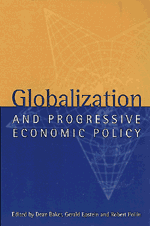Book contents
- Frontmatter
- Contents
- List of figures
- List of tables
- List of contributors
- Editors' acknowledgments
- 1 Introduction
- I The IMF, the World Bank, and neo-liberalism
- II Foreign direct investment, globalization, and neo-liberalism
- III Globalization of finance
- IV Trade, wages and the environment: North and South
- 10 Openness and equity: regulating labor market outcomes in a globalized economy
- Comment by Jaime Ros
- 11 Integration and income distribution under the North American Free Trade Agreement: the experience of Mexico
- Comment by Thea Lee
- 12 Malthus redux? Globalization and the environment
- Comment by Peter Dorman
- V Migration of people in a global economy
- VI Globalization and macroeconomic policy
- Bibliography
- Index
10 - Openness and equity: regulating labor market outcomes in a globalized economy
Published online by Cambridge University Press: 04 August 2010
- Frontmatter
- Contents
- List of figures
- List of tables
- List of contributors
- Editors' acknowledgments
- 1 Introduction
- I The IMF, the World Bank, and neo-liberalism
- II Foreign direct investment, globalization, and neo-liberalism
- III Globalization of finance
- IV Trade, wages and the environment: North and South
- 10 Openness and equity: regulating labor market outcomes in a globalized economy
- Comment by Jaime Ros
- 11 Integration and income distribution under the North American Free Trade Agreement: the experience of Mexico
- Comment by Thea Lee
- 12 Malthus redux? Globalization and the environment
- Comment by Peter Dorman
- V Migration of people in a global economy
- VI Globalization and macroeconomic policy
- Bibliography
- Index
Summary
Introduction
Advocates of interventionist employment and labor market policies have long recognized that the internationalization of economic relations held the potential to undermine the pursuit of domestic goals such as full employment and wage growth. As the architects of progressive labor market policies struggled to construct the instruments for employment and income regulation at a national level (including both macroeconomic demand management policies and more micro-level structures of labor market regulation such as unionization and minimum wages), the emergence of a fundamentally deregulated international economy threatened to undermine the effectiveness of these measures.
What has been the effect of globalization on labor markets, and on the institutions and policies that were established in the postwar era to promote more equitable and socially beneficial outcomes in labor markets and in income distribution generally? The answer to this question depends centrally on one's underlying theoretical model of what determines those labor market outcomes in the first place. In mainstream economic theory, where competition and market-clearing determine employment and income distribution in a fashion that is both self-regulating and socially optimal, international economic integration promises a movement of the global economy toward a more efficient general equilibrium position, thus creating the basis for a mutual, Pareto-improving increase in social well-being (across nations and potentially across social classes). In alternative models, demand side constraints become relevant, and labor market outcomes depend on an interaction of socio-institutional and macroeconomic factors; globalization may then have negative effects on both labor market outcomes and on the ability of existing policy instruments to regulate or offset those outcomes.
- Type
- Chapter
- Information
- Globalization and Progressive Economic Policy , pp. 245 - 270Publisher: Cambridge University PressPrint publication year: 1998
- 6
- Cited by



